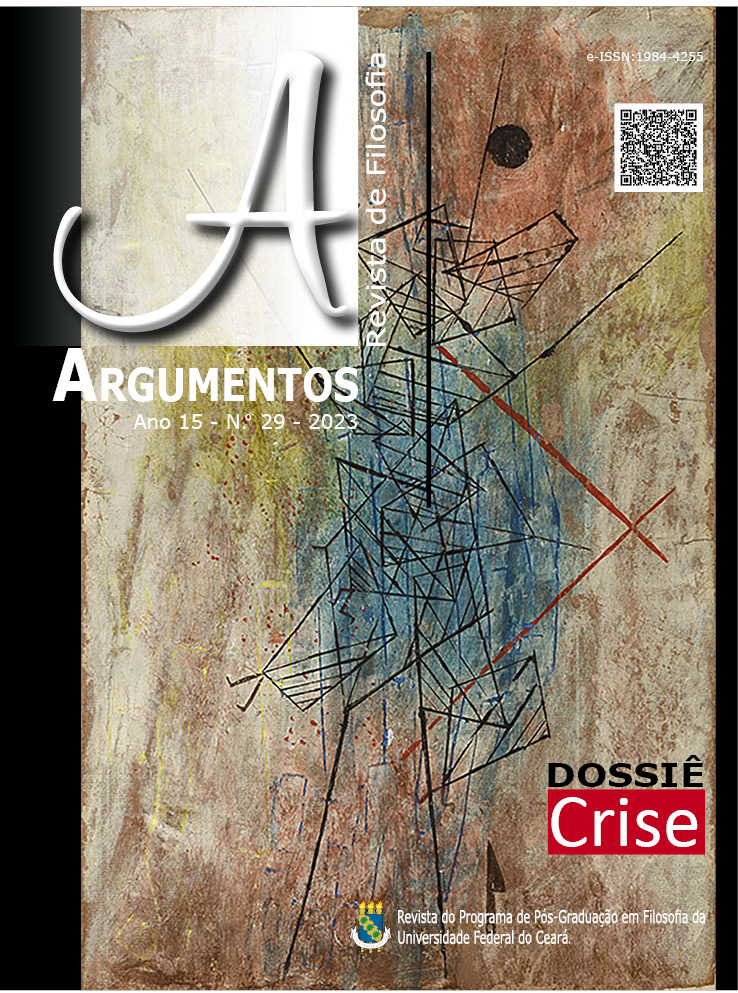The critical intertwining of historicity: historicity as phenomenological and existential crisis in Merleau-Ponty’s works
DOI:
https://doi.org/10.36517/Argumentos.29.2Palavras-chave:
Merleau-Ponty. Historicity. Existencial Crisis.Resumo
Merleau-Ponty’s account of historicity is significant both as a phenomenological account and as an existential account of our historical situation. Of course, these aspects of his work are not mutually exclusive, but intertwined. And each aspect contributes to the sense of crisis of human historicity. We will first consider the phenomenological crisis of historicity—which is to say, we will consider the crisis of historicity phenomenologically. This is the attempt to reveal the conditions of the possibility of history from within history or the structure of our historical situation—where Merleau-Ponty’s position departs from Husserlian phenomenology. Next, we will consider the existential crisis of historicity—which is to say, we will consider the crisis of historicity existentially. This is the attempt to understand the imperative that things matter to us historically. Finally, we will briefly indicate the importance of these aspects of our historicity as a critical intertwining. This critical intertwining reveals the mutual encroachment of the “how” and the “why” of our historicity, which Merleau-Ponty describes at the end of his career as chiasmic existence within the flesh of the world. The critical intertwining as interrogation of our historical being provides the "who" "what" "when" and "where" of our historicity.
Downloads
Referências
DAVIS, D. H. “Completing the Existential Recovery of Language”. On: Journal of the British Society for Phenomenology, Vol.21, No.2, May, 1990, pp.175-184.
DAVIS, D. H. “The Art of Revolutionary Praxis: Ghosting a History without Shadows”. In: International Sartre Studies, 27:1, July, 2021, pp.76-98.
DAVIS, D. H. “The Philosopher of Modern Life: Baudelaire, Merleau-Ponty, and the Art of Phenomenological Critique”. In: DAVIS, D. H.; HAMROCK, W. S. (Eds.). Merleau-Ponty and the Art of Perception. State University of New York Press, 2016, pp. 165-185.
DAVIS, D. H. (Eds.). Merleau-Ponty’s Later Thought and its Practical Implications: The Dehiscence of Responsibility, Humanity Books, Prometheus Press, 2001.
EVANS, R. The Coming of the Third Reich, Penguin, 2003
GORDON, L. Fanon and the Crisis of European Man: An Essay on Philosophy and the Human Sciences. Routledge, 1997.
HUSSERL, E. “Philosophy as a Rigorous science”. In: LAUER, Q. (Ed.). Phenomenology and the Crisis of Philosophy. New York: Harper & Row, 1965. pp. 71-148.
MARX, K.; ENGELS, F. Karl Marx und Friedrich Engels: Werke, Band 3, Karl Marx und Friedrich Engels 1845-1846. Berlin: Dietz Verlag, 1953.
MERLEAU-PONTY, M. Le visible et l’invisible [Ed. C. Lefort]. Paris: Gallimard, 1964a.
MERLEAU-PONTY, M. Les aventures de la dialectique. Paris: Gallimard, 1955.
MERLEAU-PONTY, M. “‘Les Fondateurs’ and ‘La Découverte de l'Histoire’: Two Short Pieces Excluded from ‘Everywhere and Nowhere’”. Trans. Duane H. Davies. In: Man and World, Vol.25, No.2 (April 1992), pp.203-209.
MERLEAU-PONTY, M. L’Oeil et l’esprit. Paris: Gallimard, 1964b.
MERLEAU-PONTY, M. Notes de cours 1959-1961 (ed. S. Ménasé]. Paris: Gallimard, 1996.
MERLEAU-PONTY, M. Phénoménologie de la perception. Paris: Gallimard, 1960a.
MERLEAU-PONTY, M. Sens et non-sens. Paris: Gallimard, 1960b.
MERLEAU-PONTY, M. Signes. Paris: Gallimard, 1960c.
MERLEAU-PONTY, M.; ALQUIÉ, F. Les Philosophers Célèbres. Paris: Mazenod, 1956.
Downloads
Publicado
Edição
Seção
Licença
Copyright (c) 2022 Argumentos - Revista de Filosofia

Este trabalho está licenciado sob uma licença Creative Commons Attribution 4.0 International License.
Autores que publicam nesta revista concordam com os seguintes termos (SOBRE COPYRIGHT E POLÍTICA DE ACESSO LIVRE):
1. Autores mantém OS DIREITOS AUTORAIS concedidos à revista OU Direito de Primeira Publicação, com o trabalho simultaneamente licenciado à Atribuição de Licença Creative Commons (CC BY) que permite o compartilhamento dos trabalhos com reconhecimento de autoria e publicação inicial nesta revista.
2. Autores têm permissão para aceitar contratos, distribuição não-exclusiva da versão do trabalho publicada nesta revista (por exemplo: publicar no repositório institucional ou como um capítulo do livro), com reconhecimento de autoria e publicação inicial nesta revista.
3. Autores têm permissão e são estimulados a publicar e distribuir seu trabalho on-line (por exemplo: em repositórios institucionais ou em sua página pessoal) mesmo durante o processo editorial, haja visto que isso pode aumentar o impacto e citação do trabalho publicado.




.jpg)










._._3.png)
1.jpg)
._._._.png)
